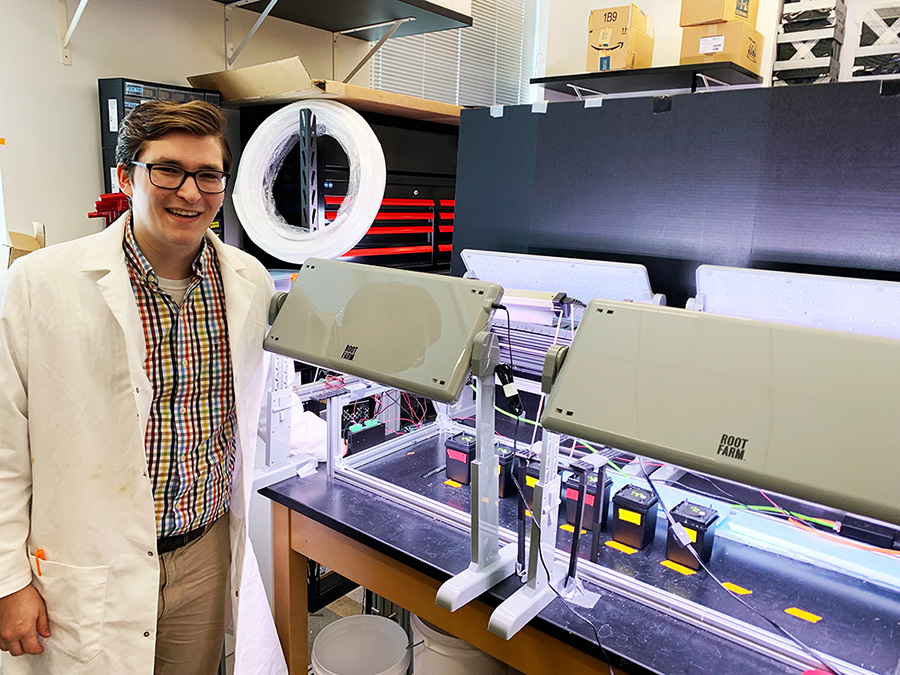
Story and photography by Logan Jackson
The Cherng Summer Scholars program turned a research curiosity into a full-fledged passion for Landon Swartz. The nine-week program, supported by a gift from Peggy and Andrew Cherng and the Panda Charitable Foundation, allows University of Missouri students pursuing the Honors certificate the opportunity to spend a summer participating in research and other creative projects.
Swartz, who is from Springfield, Missouri, joined the laboratory of David Mendoza-Cózatl, an associate professor in the Division of Plant Science and Technology (MU College of Agriculture, Food and Natural Resources), toward the end of his freshman year. He stayed in that lab for the Cherng Summer Scholars program and is currently pursuing a PhD in computer science with the same group.
“My research journey was made possible because of the generosity of the Cherng family,” said Swartz, who earned a computer engineering degree and the Honors certificate in 2022 from Mizzou. “The research that I conducted through the Cherng Summer Scholars program eventually led to a published paper, as well as other collaborative projects. The program was an amazing opportunity for me to develop as a scientist.”
When Swartz, who minored in biology, first came to MU he was named a Show-Me Scholar, a scholarship that was also made possible by the Cherng family. The award is given to high-achieving students from Missouri.
“Because of that scholarship, I was able to devote a lot of time to the exploration of my computer engineering degree,” Swartz said. “It gave me financial flexibility and I didn’t have to take on a part-time job to help pay for school. That exploration led to me finding research.”
The primary goal of the Mendoza-Cózatl lab is to understand how plants take up, accumulate and transport trace metals between roots and leaves (plant nutrition), and from leaves to seeds (for human nutrition). Swartz helped develop open-source plant phenotyping devices to capture dynamic changes in Arabidopsis leaves using a robotic platform.
“Among many projects, we have been studying how plants sense and take up iron,” Swartz said. “We use a lot of computer science and engineering techniques to observe changes in the plants over time at a deeper and more robust level. We’re also characterizing how we can help plants better take up iron with the hope that this can translate into helping individuals better take in iron.”
While Swartz’s research has changed a bit from his time as an undergraduate student, he is still providing computer science and engineering solutions to plant science questions. He said that he chose to stay at MU for his PhD because of the relationships he developed with researchers across campus.
“It’s really great how invested Mizzou is in undergraduate research,” Swartz said. “I really appreciated being able to formulate my own ideas, plan my own projects and then execute my research vision. I get to tell a story through science, which is amazing.
“The other exciting part for me is how interdisciplinary my work has been. I’ve built great relationships with so many researchers at Mizzou, especially in engineering. It felt natural to stay here for my PhD, lay down my roots and continue to build on what I’ve started.”
Swartz said that the computer engineering program, offered through the MU College of Engineering, allowed him to combine his interests in robotics and computers. He was able to build a large research network on campus through a handful of clubs and organizations, including the BioInformatics in Plants (BIPS) program, which brings computer science and biology students together.
Swartz was an active member of the Honors College as an undergraduate student as well. One of his biggest roles came as an Honors Ambassador.
“The Honors College was one of the best things about Mizzou for me,” Swartz said. “It’s the place where I first found community and it made a big college feel smaller. It was also an amazing way of expanding my understanding of the world. I was able to interact with so many incredible individuals who brought new perspectives. I made several deeper connections that have continued to have meaningful impacts on me as a person.”
Swartz said he is interested in continuing his research journey even after finishing his PhD. While his passion for research has only continued to grow during his time at Mizzou, he has also found joy in the collaborative work that is possible with his interest areas.
“Research is the itch you can never scratch; there are always more questions to answers and techniques to try,” Swartz said. “It’s truly exhilarating and very rewarding. Everything I’m doing is for the betterment of society and to help others. It’s been very important to me to keep that perspective with my research.
“I also want to continue to build that bridge between computer science, engineering and biology. I want to advance science in an interdisciplinary way, with a focus on combining our fields of study to better understand the world.
“I thankful for the support I’ve received from the Cherng family, as well as the Honors College, as I pursue my dreams.”